3-Iron
This was such a surprising film! The previous film of Korean director Kim Ki-duk , "The Isle (Seom)", is still not letting me go but at the same time it is one of the most disturbing things to watch. I didn't quite expect something as romantic and out-wordly as "3-Iron" from the same director.
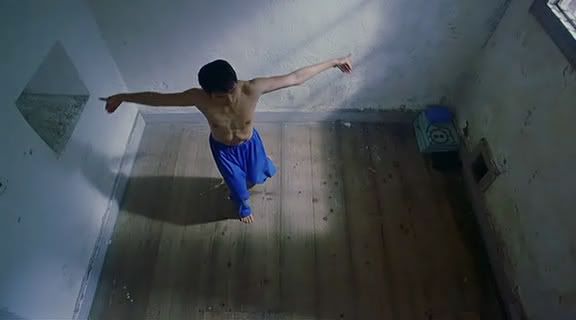
Title I feel that "3-iron" doesn't work the best for this film's title. Original tile, Bin-jip, is directly translated as "Empty Houses" which seems much more fitting.
Story A young, well-educated man spends his days travelling on a bike and living in the other people's houses whilst they are away (he pays by doing minor repairs and laundry). He meets a woman one day in one of the houses - she is silent and exquisitely beautiful. It is immediately clear that she is abused by her husband. This is the beginning of the story and at first everything seems more or less normal (but strange).. But by and by, when the film ended I didn't quite know what to make of it and many different theories and explanations were swarming in my head.
Directing/Cinematography/Music The film is gorgeous. One of the reasons I am a big fan of Korean cinema is that cinematographic teams there seem to have such a magic with colours and composition. Kim Ki-duk's films stand apart a little - they don't give me an impression that any special filter or computer technique was used. All colours look natural but on a whole a sense of haunting beauty is created, even in ordinary things. This is also magnified by the soundtrack that is so beautiful that it makes you cry.
I find one of the trivia facts absolutely amazing - the film was filmed in 16 days. This seems to be incredibly impressive and I if I didn't know this fact I would have thought that it took months of hard work to achieve the film's wonderful "life as a dream" feeling.
Music (and silence) play a huge part in the overall impression this films gives. Both main protagonists don't utter a word and this sets them apart, gives their relationship special meaning. And oh! I never thought that you can say so much without saying a word.
I find his expression beautiful but quietly disturbing here:
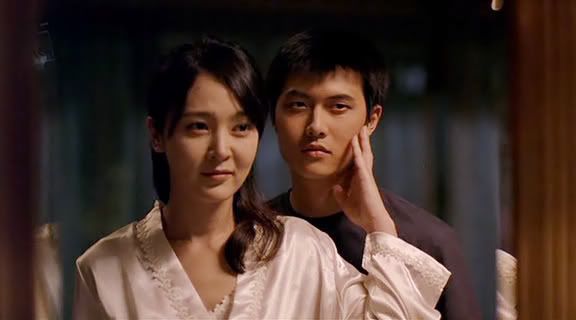
This is the most amazing, almost choreographic last scene:
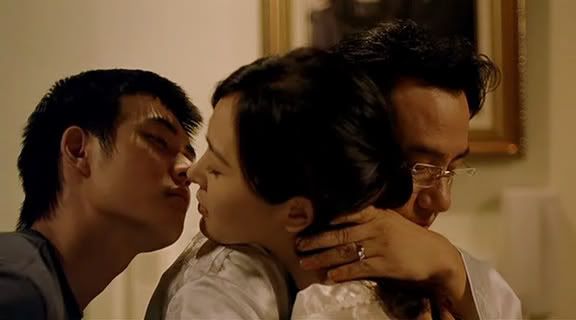
I find this interesting - one quite often comes across Christian symbols in Korean
films. I wonder how popular Christianity is there.. This is one of the houses:
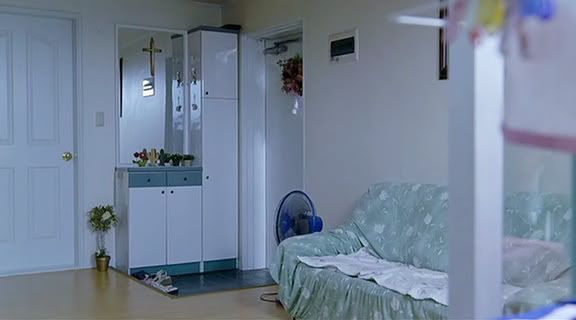
I find this very interesting too - the image of someone hand-washing their laundry keeps appearing in Korean films. I wonder how popular this is.
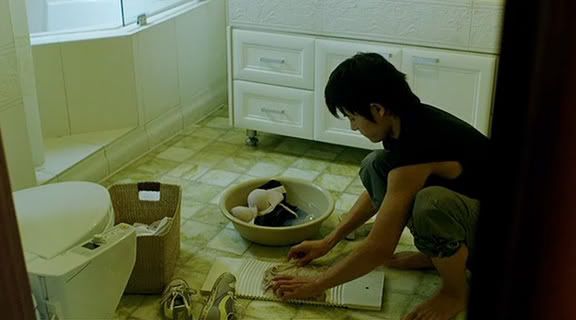
************** Spoilers *****************
From the moment Tae-Suk (the male lead character, played by Jae Hee) and Sun-Hwa (the female lead character, played by Lee Seung-Yeon) run away together everything becomes rather mysterious. They wonder, they get in trouble with police but the feeling of reality shifts. After Tae-Suk is put in prison (and Sun-Hwa returns to her husband) he tries to develop an ability of being invisible. It doesn't come as a surprise as being invisible is an ultimate of being silent.
Finally, Tae-Suk escapes from the prison and comes back to live as a "ghost" with Sun-Hwa and her husband. At least, so it seems. I rather thought that in reality Tae-Suk died in prison and Sun-Hwa created a make-believe image of him for herself. Or even more, they both died somewhere in the middle of the film (but which moment?) and she also was a make-believe for her husband. In support of this theory, below is the very last screenshot is of Sun-Hwa and Tae-Suk standing on weight scales together. And scales show zero!!!!!!! But of course, there are other explanations!!!!
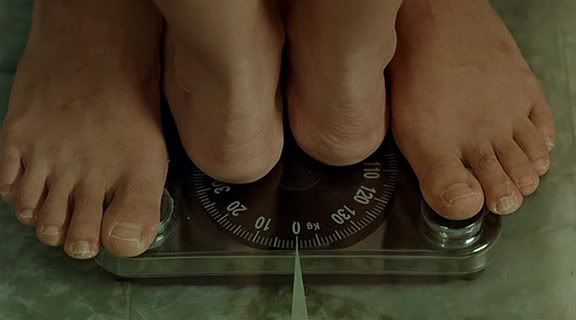

Title I feel that "3-iron" doesn't work the best for this film's title. Original tile, Bin-jip, is directly translated as "Empty Houses" which seems much more fitting.
Story A young, well-educated man spends his days travelling on a bike and living in the other people's houses whilst they are away (he pays by doing minor repairs and laundry). He meets a woman one day in one of the houses - she is silent and exquisitely beautiful. It is immediately clear that she is abused by her husband. This is the beginning of the story and at first everything seems more or less normal (but strange).. But by and by, when the film ended I didn't quite know what to make of it and many different theories and explanations were swarming in my head.
Directing/Cinematography/Music The film is gorgeous. One of the reasons I am a big fan of Korean cinema is that cinematographic teams there seem to have such a magic with colours and composition. Kim Ki-duk's films stand apart a little - they don't give me an impression that any special filter or computer technique was used. All colours look natural but on a whole a sense of haunting beauty is created, even in ordinary things. This is also magnified by the soundtrack that is so beautiful that it makes you cry.
I find one of the trivia facts absolutely amazing - the film was filmed in 16 days. This seems to be incredibly impressive and I if I didn't know this fact I would have thought that it took months of hard work to achieve the film's wonderful "life as a dream" feeling.
Music (and silence) play a huge part in the overall impression this films gives. Both main protagonists don't utter a word and this sets them apart, gives their relationship special meaning. And oh! I never thought that you can say so much without saying a word.
I find his expression beautiful but quietly disturbing here:

This is the most amazing, almost choreographic last scene:

I find this interesting - one quite often comes across Christian symbols in Korean
films. I wonder how popular Christianity is there.. This is one of the houses:

I find this very interesting too - the image of someone hand-washing their laundry keeps appearing in Korean films. I wonder how popular this is.

************** Spoilers *****************
From the moment Tae-Suk (the male lead character, played by Jae Hee) and Sun-Hwa (the female lead character, played by Lee Seung-Yeon) run away together everything becomes rather mysterious. They wonder, they get in trouble with police but the feeling of reality shifts. After Tae-Suk is put in prison (and Sun-Hwa returns to her husband) he tries to develop an ability of being invisible. It doesn't come as a surprise as being invisible is an ultimate of being silent.
Finally, Tae-Suk escapes from the prison and comes back to live as a "ghost" with Sun-Hwa and her husband. At least, so it seems. I rather thought that in reality Tae-Suk died in prison and Sun-Hwa created a make-believe image of him for herself. Or even more, they both died somewhere in the middle of the film (but which moment?) and she also was a make-believe for her husband. In support of this theory, below is the very last screenshot is of Sun-Hwa and Tae-Suk standing on weight scales together. And scales show zero!!!!!!! But of course, there are other explanations!!!!
